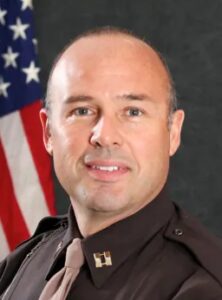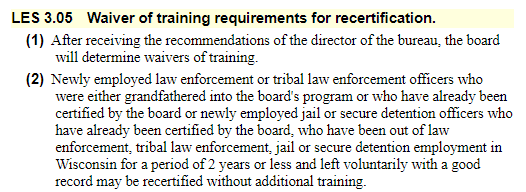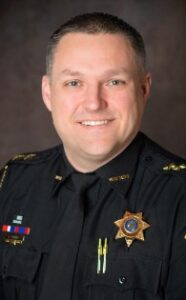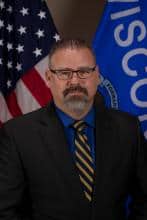At a time when law enforcement agencies throughout Wisconsin are struggling due to a recruitment crisis, a state board quietly changed a rule that is making it worse.
A quiet state policy change made in 2021, during the “defund the police movement,” that is imperiling the ability of law enforcement agencies throughout Wisconsin to hire former part-time officers, which many rely on.
Washington County Sheriff Marty Schulteis told WRN that he was aware of this policy change but was certain many part-time officers are not.
Schulteis said that his agency relies on part-time deputies for a variety of public safety missions that include security checkpoints at the Justice Center, prisoner conveyances, and special assignments at community events such as the county fair, after-hours school functions, and other special security events.
His agency employs about 20 part-time officers.

Schulteis continued, “What the policy does not take into consideration are the full-time officers that retire and then pick up a part-time job for a period. If they have any break in service, they fall under the new policy even if they have decades of full-time experience. We have had individuals that fall into this category after retiring and moving to Washington County. We are now not able to utilize that level of experience after the change. For the agencies that utilize part-time help, this simply makes the recruitment even more difficult in a time where staffing public safety personnel is already challenging.”
Tom Kelly, chairman of the Board of the Balsam Lake Protection and Rehabilitation District, wrote the Wisconsin Law Enforcement Standards Board and said that the water patrol agency hires all officers on a part-time basis “and we struggle to find qualified part-time officers.”
“From what I have read, small towns throughout the state are having problems staffing their departments. I find it hard to understand why the LES board is making it difficult for part-time officers who are in good standing to continue to work,” wrote Kelly.
Wisconsin Right Now has learned that, prior to March 2, 2021, all law enforcement officers in Wisconsin had three years to regain employment without going through lengthy and costly training again. However, on that date, the board added the word “full-time,” leaving part-time officers in limbo.
 Loading...
Loading...
That decision resulted in part-time officers losing their certification if they don’t find a new law enforcement job the day AFTER they leave a department, preventing well-qualified people from working in law enforcement at a time of a recruitment crisis. Some are seasonal hires.
The Training and Standards Bureau coordinates a variety of criminal justice initiatives and serves as the staff of the Law Enforcement Standards Board. The Training and Standards Bureau falls under the jurisdiction of Attorney General Josh Kaul’s office.
The change is affecting agencies from city police departments to sheriff’s departments to tribal police forces to seasonal positions patrolling lakes.
It’s one of those technical changes that can have sweeping impact on people’s lives, public safety, and local departments, many of which rely on part-time police officers.
It all boiled down to the insertion of a single word.
The change, for which there is seemingly no clear rhyme nor reason, comes as Wisconsin’s number of law enforcement officers has plummeted. Repeated requests to the DOJ, the Training and Standards Bureau, and board members went unanswered.
Violation of State Administrative Code?
The LESB policy change seems to be in direct contradiction of State Administrative Code LES 3.05 which says, “Newly employed law enforcement or tribal law enforcement officers who were either grandfathered into the board’s program or who have already been certified by the board or newly employed jail or secure detention officers who have already been certified by the board, who have been out of law enforcement, tribal law enforcement, jail or secure detention employment in Wisconsin for a period of 2 years or less and left voluntarily with a good record may be recertified without additional training.”

Since 2008, the number of law enforcement officers in the state has dropped by 1,000 officers. That number includes full-time officers. That comes as crime has spiked throughout Wisconsin.
Yet, the board’s policy change prevents part-time police officers from keeping their certification to take new law enforcement jobs, if there is any gap at all between employment, even one day. Full-time officers retain their certification for three years after leaving a force. Part-time officers get no time.
Part-Time Officers
Law enforcement agencies employ part-time officers to support patrol functions, conduct prisoner conveyances, and staff events like county fairs, and seasonal positions like boat patrols. These positions are often filled by retired police officers or people with other full-time careers.
For example, the Big Bend Police Department in Waukesha County has 3 full-time and 9 part-time officers.
A check of WILENET, a resource website for Wisconsin law enforcement, shows at least 20 agencies currently advertising for part-time law enforcement positions.
Currently, Wisconsin law enforcement recruits must undergo a 720-hour, 18-week course at a police academy which typically costs $5,000 to $6,000.
Part-time officers are typically paid an hourly rate lower than full-time officers and usually do not receive typical employee benefits like health insurance.

Kewaskum Police Chief Tom Bishop also expressed concerns, saying, “I do see some issues with this change. Part-time officers are extremely valuable to smaller agencies around the State, especially those part-time agencies that run a boat patrol or other type of seasonal enforcement.”
Bishop continued, “A department looking to hire an experienced part-time officer is very unlikely to hire and pay an officer who needs to attend the academy for their first 720 hours (4½ months) of employment just because they lost their certification due to being out of law enforcement for a very short period of time. What if the officer’s employment ended due to something out of their control, such as a small department. I am not sure why the LESB would’ve changed this language.”
 Dodge County Sheriff Dale Schmidt has a different take. Schmidt is the president of the Badger State Sheriff’s Association. Schmidt told WRN, “The Sheriffs and Chiefs in Wisconsin have representation on the LESB and as such, BSSA receives reports back from those sheriffs at our meetings. In, fact, the chair of the committee is a Sheriff. The information is also posted and available to everyone on the WILENET website for all law enforcement and even the public to be able to review as far as what the standards are.”
Dodge County Sheriff Dale Schmidt has a different take. Schmidt is the president of the Badger State Sheriff’s Association. Schmidt told WRN, “The Sheriffs and Chiefs in Wisconsin have representation on the LESB and as such, BSSA receives reports back from those sheriffs at our meetings. In, fact, the chair of the committee is a Sheriff. The information is also posted and available to everyone on the WILENET website for all law enforcement and even the public to be able to review as far as what the standards are.”
“It is a difficult thing to make sure that the law enforcement officers we have in the state are properly trained and ready to deal with the challenges law enforcement faces every day,” he added. “Without proper training, there can be a significant liability to the people we serve, and it puts law enforcement in a difficult position to do the job as safely as possible for the citizens and our employees’ well-being. In my opinion, we have the best trained law enforcement officers in the country because we have high standards. Anyone who fails to meet the standards will need to be re-trained to keep our citizens safe.”
However, to be clear, the rule change is not about officers with performance issues or who fail to meet training standards. It’s about immediately de-certifying part-time officers when they separate from an agency.
The Out-of-State Reciprocity Contradiction
A few years ago, the Board instituted a rule that allowed for the reciprocity of officers from other states. The rule allows out-of-state officers to WAIVE the 720-hour basic training requirement if they worked at least one year full-time within the last 3 years in their home state.
This means an out-of-state officer with one year of experience who left just under 3 years ago is granted a waiver of the 720-hour recruit training over a Wisconsin-trained officer who has worked part-time for many years but has a gap of employment of even just one day.
Wisconsin Law Enforcement Standards Board
The Wisconsin Law Enforcement Standards Board is made up of various law enforcement officials throughout the state. Currently, the Milwaukee and Dane County Sheriffs are among those on the board, as is the Democratic DA of La Crosse. The makeup of the board was different in 2021.
At the March 2, 2021, these board members were in attendance, according to the minutes:
LESB MEMBERS
Robert Botsch
Todd Delain
Chris Domagalski
Jean Galasinski
Jennifer Harper
Casey Krueger
Scott Parks
Kurt Picknell
James Small
Charles Tubbs
Tina Virgil
Michelle Viste
LESB STAFF
Ronald Betley
Carol Curfman
Stacy Lenz
Katie Maule
Jerry Mullen
Stephanie Pederson
Thessa Phillips
Dan Ruzinski
Shelly Sandry
Frank Sullivan
Dana Vike
Steve Wagner
The minutes are vague. They say, “LESB Policy and Procedures Manual Updates and Academy Director’s Manual Updates. The LESB was presented with changes to the LESB Policy and Procedures Manual and the Academy Director’s Manual. Motion to accept staff recommendations on changes to the LESB Policy and Procedures Manual and the Academy Director’s Manual. Move by Kurt Picknell, second Michelle Viste. Motion carried unanimously.”
Bureaucratic Wall of Silence

For this story, we reached out to several staff and board members of the Wisconsin Law Enforcement Standards Board including Bureau Director Ron Betley and Curriculum & Certification Staff Supervisor Dana Vike.
We wanted to how many part-time officers there are in the state, how many officers have been affected by the rule change, who was responsible for this rule change and why it happened.
ALL questions were ignored, and we were finally directed to WI Department of Justice media relations for those questions.
Phone calls and emails to the DOJ resulted in no response.
For a follow-up story, any law enforcement officers or administrators who would like to comment on this rule change or any legislators who are interested in this issue, please email us at [email protected].
Table of Contents
































